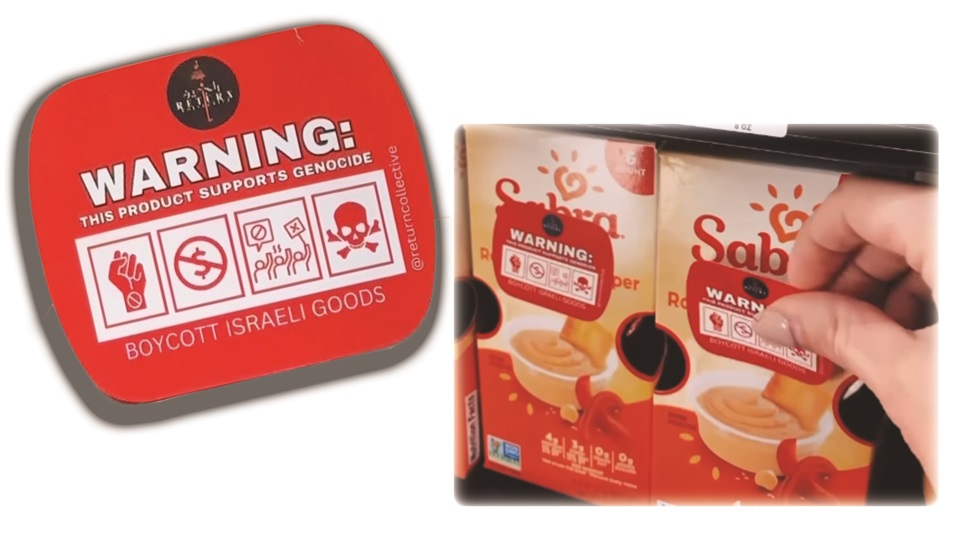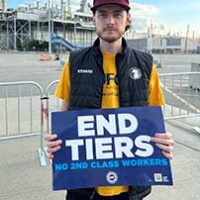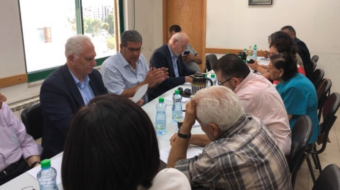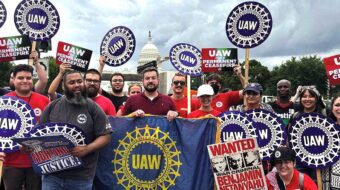
DETROIT—With genocide still raging and bombs still dropping in Gaza, the question of “What is to be done (next)?” occupies the minds of peace activists everywhere. One Detroit-based group, the Raj’een (Return) Collective, is answering the question with a locally-focused Boycott, Divestment, and Sanctions (BDS) campaign.
People’s World was invited to attend an organizing committee meeting in Detroit’s former industrial east side where members were meeting to hash out their tactics. The activists in the Collective are predominantly Arab youth and come from a variety of towns and cities all over Southeast Michigan.
Amal Altashi, a local organizer with the collective, is a Yemeni-Turkish American. While she isn’t Palestinian herself, she said that solidarity with the struggle in Palestine is a key focus of her political work.
“Those of us that are Yemeni, Arab, Muslim, etc. have a lot of support for the Palestinians,” she said. She also pointed to the fact that Israel’s war has already spilled over the borders of occupied Palestine and involves several countries, including Yemen, where forces have tried to blockade Israeli ships in the Red Sea.

The Return Collective recently launched “Operation Sticker Flood,” which has seen activists placing stickers on products that were either produced in Israel or on brands that economically support the far-right Israeli apartheid regime.
Notable names including Starbucks, Nestlé, Sabra, Frito-Lay, Lean Cuisine, and Coca-Cola are among those targeted with labels that read: “Warning! This product supports genocide” and “Boycott Israeli goods.”
“Our first initiative is focused on boycotts,” Altashi said. The goal, she argued, is to draw consumers’ attention to where many big corporations are putting their money.
The Boycott, Divestment, and Sanctions (BDS) campaign was originally launched in 2005 with the endorsement of over 170 Palestinian organizations. In 2007, the first BDS conference was held in Ramallah and led to the creation of the BDS National Committee.
The tactic of boycotting has been deployed repeatedly throughout history as a tried-and-true method of direct action against both corporate giants and oppressive governments. Well-known examples include the campaign to boycott products from Nazi Germany in the 1930s, the United Farm Workers’ grape boycotts of the ’70s, and the anti-apartheid boycott and divestment movement against the racist South African government in the ’80s.
Since the current war erupted, the BDS campaigns targeting the right-wing Israeli state and the multinational corporations which back it have been re-energized. The only thing these big companies pay attention to is their profits, Sahar Faraj, a Palestinian organizer and attorney with the Return Collective, asserted. “So that’s what we will be targeting.”
It seems such tactics are having an effect. Recently, after months of protests and boycotts, athletic wear manufacturer Puma announced it would not be renewing its sponsorship of the Israeli Football Association in 2024. The company said its decision had nothing to do with boycotts or the criticism it’s received, but many activists believed that claim was likely an effort to save face.

In February, Starbucks CEO Laxman Narasimhan told Wall Street analysts on an earnings call that the company “saw a negative impact to our business in the Middle East…and the U.S.”
That didn’t stop the coffee corporation from trying to exploit the razing of Gaza and the popular support of the Palestinian struggle in order to bust the Starbucks Workers United (SBWU) union campaign, though. It attempted to use the union’s calls for a ceasefire as a political weapon. Despite the union-busting attacks, SBWU did not back down, though, and the corporate behemoth eventually agreed to bargain with the union on its workplace demands.
Moreover, the solidarity shown by the Starbucks workers led to the BDS movement to support their union drive. It was an example of the growing solidarity and cooperation between the labor and peace movements, a trend which continues to gain momentum and is becoming a powerful force in our nation’s political life.
It’s a trend that’s going global, too. Transportation workers continue to refuse to load or unload weapons or products destined for Israel in Belgium, for instance, while workers and activists in California have blockaded cargo ships carrying U.S. aid to Israel.
The Return Collective is not stopping at campaigns focused on individual consumers, though. “We’re also working with small businesses within our communities to build ‘Apartheid-Free Zones,’ inspired by those successfully created in Ireland,” Altashi told People’s World.
“We’re organizing working meetings to answer questions on this campaign, get our community members activated, organized, and ready to work in helping us achieve our goals,” she said.
“Our research team works to find alternatives” that consumers and businesses can choose instead of Israeli-made or Israel-linked products. The group then uses “social media as a tool for further educating our communities” on the choices available and to inform them about the right-wing nationalist ideology of Zionism that the Israeli state pushes.
The Return Collective aims to directly reach out to the communities where its members live and garner support for the boycott campaign. The first targets in establishing Apartheid-Free Zones are Dearborn and Detroit.
“This program allows our communities to make a larger impact with their dollars, whether it be understanding where their money really goes or making more conscious and ethical consumer choices,” Altashi said. “Business owners have the power to decide what products they make available for our communities to purchase, why not have them be Apartheid Free?”
Pointing to a unique aspect of the retail landscape in Dearborn, Sahar said that many of the businesses are owned by Arab Americans, some by Palestinian Americans, even. When stocking their store shelves, Sahar said many may be unaware that the products they purchase and offer for sale to customers could be directly or indirectly supporting the Israeli state.

“This is where our collective’s boycott program comes into play,” Sahar said.
The Return Collective understands that it’s a big ask to have small businesses remove items from their retail offerings, and that’s why they are seeking to work directly with shopkeepers to help find alternatives and work together to establish Apartheid-Free Zones.
“By educating and mobilizing our people, we can make significant contributions in the struggle to free Palestine,” Altashi said.
The Return Collective encourages and welcomes those who are ready to use their skills to help move these initiatives forward. They can be contacted here.
Amal Altashi contributed to this story.
We hope you appreciated this article. At People’s World, we believe news and information should be free and accessible to all, but we need your help. Our journalism is free of corporate influence and paywalls because we are totally reader-supported. Only you, our readers and supporters, make this possible. If you enjoy reading People’s World and the stories we bring you, please support our work by donating or becoming a monthly sustainer today. Thank you!












Comments